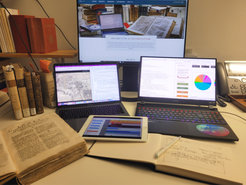Expressing legal historical data in digital environment: methods and approaches for the Congregation of the Council data analysis and visualization
Forschungsprojekt

This project focuses on research approaches and methodology to the data and metadata on the history of the Congregation of the Council (SCC) collected in the framework of the Research Group Normative Knowledge in the Praxis of the Congregation of the Council. The Production of Normative Categories and Models for the Post-Tridentine World. Examining the early modern and modern periods, we consider that adequate historical contextualization of data is necessary in order to avoid anachronistic or teleological biases and thus to interpret the results in scientific ways that correspond academic standards of historical research. To contextualize the SCC data and its metadata in the 16th-20th centuries Catholic World, we developed visualizations and a research environment that allow to research the data not only as tables but also in interactive formats, to improve accessibility from the user perspective and provide valuable resources for research.
This project aims to create and maintain the digital tools for research and visualization of the SCC data and metadata and makes a decisive contribution to the realization of the SCC Explorer. An Interactive Platform on the History of the Congregation of the Council. A necessity of this project came from the large scaled archival data and historiography of the SCC, which includes information about actors, institutions, places, norms, praxes, etc. Accordingly, we proceeded this data and prepared the resources for further development of the platform, which allows users to perform their research in the fields, related to the SCC topics, such as the legal history, canon law, church history, etc. The platform follows the FAIR principles: this is a scalable and open-source project, which makes the SCC data accessible in a systematized way. Functions are designed for possible reuse with other datasets.
All the components of the platform, including the front-end and back-end parts, are created from scratch using R and JavaScript languages. All the code is available on the GitHub page of the Research Group.
